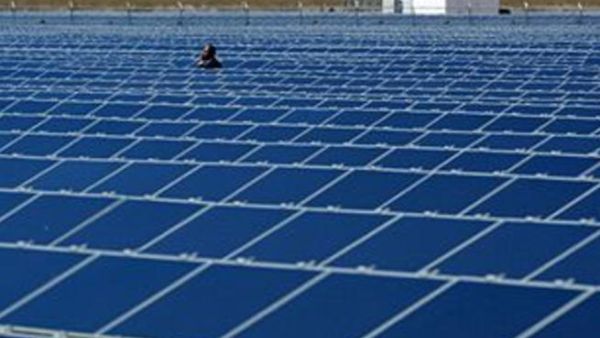Oman is blessed with abundant sunshine, and as research shows, it could be the prime energy source of the future. The knowledge, that Oman's oil and gas won't last forever, has prompted scientists and energy providers to start looking at renewable energy sources, and they're finding out that solar energy would be ideal to meet the Sultanate's energy needs, and export it, too. "Solar energy can be generated almost anywhere in Oman.
There's a huge amount of suitable land in Oman. If you use the most suitable areas of land, you can produce 780 times the energy demand of Oman," said Prof. Adel Gastli, chair of the Renewable and Sustainable Energy Research Group, sitting in his office in Sultan Qaboos University (SQU). Just 10 to 15 years ago many people thought there wasn't much point doing research on solar energy here because it was expensive and Oman has oil and gas anyway, he said. But that mentality is changing quickly. Researchers like Gastli are getting more support, and solar and other renewable energies are becoming the focus of studies at more university campuses across the country.
Also, the Public Authority for Electricity and Water has plans for two solar energy farms near Adam and Manah. Prof. Hussein Kazem, at Sohar University, has been teaching his students about renewable energy for the past five years and doing his own research since 1998, too. He says that given the rising prices of oil and natural gas and the limited supplies remaining, paired with improved and more affordable solar technology, it makes sense for Oman to opt for solar power, which is considered the most viable option in Oman in terms of renewable energy. "Most of the interest in Oman is in solar energy, which includes light and heat.
From heat we can make air conditioning or generate water vapour and make electricity. From light we can generate electricity by using photovoltaic panels (solar panels)," Kazem explained. He said there can be stand-alone systems that just provide energy for one place, and there can be systems that connect to the energy grid, providing energy to cities, for example. "These are areas we are going to concentrate on in our study," Kazem said. Kazem's students are actively involved in learning about solar energy, too. From field trips to solar energy sites in the UAE, to attending international solar energy conferences, to making their own solar water heaters, they are learning how important solar energy will be for their future, he said. This kind of research is largely supported by The Research Council (TRC), which provides grants.
Dr. Talal Al Balushi, from TRC, said solar energy is an area not just of interest to his organization, but the government is pushing it, too. "Research in solar energy is a high priority in Oman, not only for the research council. It comes higher, from the cabinet of ministries, which realises Oman needs sustainable energy that will run electricity in the country, and desalinate water. It will be the daily life need," Al Balushi said. TRC is funding several projects on solar energy at universities around Oman, including SQU and the University of Sohar. These are pilot studies to see how applicable current solar technology is, and how it can be most efficiently used, Al Balushi explained. "It takes a few years for them to come back with their results, and some of these results should be studied further and perfected. So we're looking at a minimum of five years to know that this kind of technology can be utilised in Oman," he said. Al Balushi said the community is becoming more and more aware of solar energy and its importance, too. Children learn about it at school, for example, and TRC hosts talks about it. At a recent solar energy talk, over 150 people showed up, a sign that Omanis are taking an interest in it.
Al Balushi said more companies are learning how they can use solar energy to their advantage, too, to reduce costs and reliance on fossil fuels. "We are glad that many companies are bringing this type of technology to Oman. One way of showing awareness to the public is by bringing a product to the country and seeing how the product is efficiently used here. They are doing research for us, as to which products are good," Al Balushi said. The transition away from fossil fuels will be gradual, as there is still enough fossil fuel to last between 20 and 50 years, depending on the estimates, and it's not without its challenges in Oman, but there is an increasing awareness and interest in solar energy, Al Balushi said. "In the coming generation they will be more educated and more willing to use different forms of energy. We are working on that type of awareness already." One of the current drawbacks to solar energy is that the equipment can be a bit costly.
The initial investment can be high, and the panels have to be placed in such ways to maximize their exposure to the sun. The capital cost is high, but solar panel costs are dropping and after a few years they pay for themselves, explained Kazem. "It's comparable and competitive today," said Kazem. The panels also need to be cleaned often because of the dust and humidity that accumulate on them.
Thousands and thousands of panels in the solar energy farms would have to be cleaned frequently. Studies in Abu Dhabi show that the panels have to be cleaned every two or three days. "If they have an idea of how long it takes for dust to accumulate and which is the most suitable technology and what is the suitable way to clean them, this makes our work easy. Oman can learn from them," said Kazem. Makes sense Kazem said that given the rising prices of oil and natural gas and the limited supplies remaining, paired with improved and more affordable solar technology, it makes sense for Oman to opt for solar power. He says the GCC countries rely too much on cheap fossil fuels. Gastli agrees, and said there should be more action on the part of the government and changes to energy regulations to encourage the use of solar energy.
Electricity regulation is very important because it needs to be changed to allow private solar energy sources to be hooked up to the grid. "If you want to encourage development, it means that if home users, factories, plants, shopping centres, manufacturers, or stores want to use it, at night they still have to connect to the national energy grid. But now they're not allowed to do both because there's no regulation," Gastli explained. He says there should be a lot more encouragement from the government and that it should invest in solar energy now while it has revenue from oil and gas. If all the solar potential is tapped and Oman can indeed produce 780 times its own energy needs, it could export solar energy. "You have energy for free, and you can produce more and make more income.
Even if it's expensive, start now," Gastli said. While the research and developments in solar energy in Oman are still relatively new, the results look promising, and the Sultanate is heading in the right direction, the researchers say. They say there is no question that the country's energy needs can be met with sunshine and solar heat. "There is potential here. You don't have to do much studying. Just go outside and see how much sun there is. It's obvious!" Gastli concluded.








